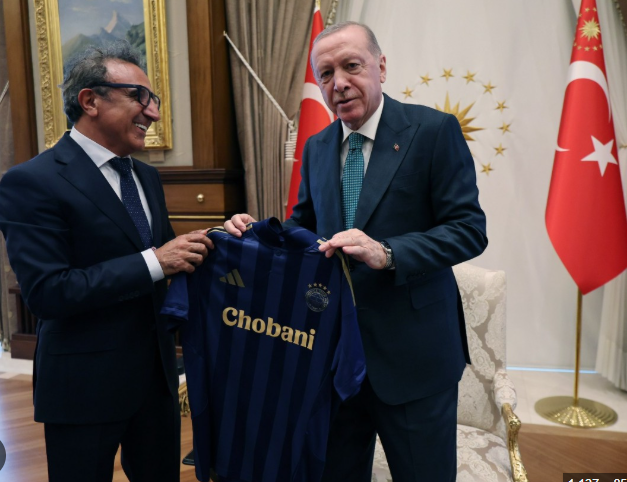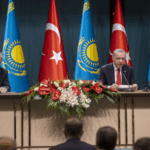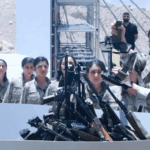Istanbul’s Fenerbahçe SK – one of Turkey’s biggest football clubs—has unveiled a historic sponsorship deal with US-based yogurt giant Chobani. Under the agreement, Chobani will pay €10 million per year for stadium naming rights over an initial five-year term, with the option to extend for another five. In addition, the company will contribute at least €4 million annually for jersey sponsorship during European competitions, under a separate two-year contract with a three-year extension clause. Depending on Fenerbahçe’s UEFA participation, the club anticipates a minimum annual income of €14 million, with the total value of the deal projected to exceed €120 million. Financially, it’s the most lucrative partnership in Turkish sports history. But instead of celebration, the move ignited nationalist furor – not for its price tag, but for the identity of Chobani’s founder, Hamdi Ulukaya, a Kurdish-American entrepreneur. What might have been a routine branding agreement quickly morphed into a flashpoint exposing Turkey’s unresolved tensions around Kurdish identity and hinting at deeper political currents beneath the surface.
A Stadium Deal Triggers Nationalist Backlash
Almost immediately after Fenerbahçe announced the stadium naming deal, a wave of backlash surged on Turkish social media. The criticism had little to do with yogurt or money – it was about ethno-politics. Ulukaya’s Kurdish background and past statements became the target. Fans and ultra-nationalists resurfaced a 2015 CNN interview in which Ulukaya said, “I left Turkey because I was Kurdish and I was very serious about Kurdish rights,” a candid remark now recast as a provocation. Detractors pointed to Ulukaya’s $2 million donation during the 2014 ISIS siege of Kobanî – aid intended for Kurdish refugees that critics insinuated was “indirectly” aiding outlawed Kurdish militants. Even Chobani’s dairy terminology was weaponized: outraged voices fumed that Ulukaya built his fortune marketing “Greek yogurt” – a term for strained yogurt that nationalists felt should be recognized as Turkish.
On Twitter and fan forums, the reactions were often vitriolic. Some users circulated doctored images splicing Fenerbahçe’s famed canary logo with the insignia of the PKK (Kurdistan Workers’ Party) guerrilla group. Others sneered that “Chobani” sounds like “Kobani,” the Syrian Kurdish town synonymous with Kurdish resistance – a none-too-subtle way of accusing the club of harboring. Ümit Özdağ, leader of the far-right Victory Party, amplified the outrage. He blasted Fenerbahçe’s management for partnering with someone he claimed had “slandered Turkey using PKK rhetoric” and “marketed Turkish yogurt in the US as Greek yogurt”. Such a move was “unbecoming” of a club, Özdağ thundered, whose identity was “rooted in Turkey’s War of Independence” and Atatürk’s proud legacy. In his view, Fenerbahçe – long seen as a pillar of Turkish republicanism – had betrayed its ethos by associating with a figure perceived as ‘pro-Kurdish‘ and ‘anti-Turkish’.
Club officials and supporters scrambled to respond. One prominent Fenerbahçe fan platform urged calm, accusing provocateurs of twisting facts to undermine the club. They noted that “Chobani” actually comes from çoban, the Turkish word for “shepherd,” not from any Syrian Kurdish reference. And Chobani’s success story was Turkish as much as Kurdish: Ulukaya is a Turkish citizen from Erzincan who never renounced his roots. Indeed, some insiders pointed out that Ulukaya has often been a boost to Turkey’s image abroad – financing Turkey’s Republic Day celebrations in Washington and funding entrepreneurship programs for the Turkish diaspora. But in the heat of the moment, such nuances were drowned out by a chorus of indignation.
Identity, Memory, and the Saracoğlu Legacy
Why did a stadium sign provoke such angst? The answer lies partly in symbolism. Fenerbahçe’s stadium has long borne the name of Şükrü Saracoğlu, a mid-20th-century Turkish prime minister and, notably, the club’s president in the 1930s and 1940s. Saracoğlu was an icon of staunch Turkish nationalism, closely tied to the early Republic’s state establishment. For over a decade, the venue was even officially titled the “Şükrü Saracoğlu Stadium”. To many, Saracoğlu’s name evokes an era of unapologetic Turkish-first policies – he is remembered for measures like the 1942 Wealth Tax that disproportionately targeted non-Turkish minorities, and for declaring himself “a true Turk, a true nationalist.” In short, Saracoğlu symbolizes Turkish ethnic chauvinism in the historical imagination.
Now, insert “Chobani” at the front of that stadium name. The juxtaposition of Saracoğlu’s legacy with the brand of a Kurdish-American businessman was jarring. It felt to hardliners like a clash of narratives: a nationalist shrine rededicated with a Kurdish touch. “What’s next, Apo Stadium?” one angry Twitter comment sneered – using PKK leader Abdullah Öcalan’s nickname to suggest a slippery slope. The optics were enough to unsettle those who see any Kurdish visibility in Turkish public life as a zero-sum threat to Turkish identity.
Yet there is another way to view the Saracoğlu-Chobani marriage: as a sign that Turkish society can evolve. Not everyone recoiled at the new nameplate. Many fans and commentators – including Fenerbahçe’s management – argued that partnering with Ulukaya is fundamentally a commercial decision, not an ethnic statement. They emphasize that Chobani has no operations in Turkey and no overt political agenda. Ulukaya’s background, they say, is incidental: he’s a self-made billionaire and lifelong Fenerbahçe supporter who wants to give back to his home country’s sports. In this telling, the real story is about Turkey’s top clubs catching up with global sports finance, tapping international sponsors to stay competitive. If Fenerbahçe can ink a deal with a global brand like Chobani, why not? To these supporters, the uproar is disproportionate and hypocritical – a distraction from the modernization of Turkish football.
Underlying this debate is a broader truth: in Turkey, sports and identity are inseparable. Football clubs have long doubled as vehicles for social and political expression. Fenerbahçe, Galatasaray, Beşiktaş – the big Istanbul teams – each carry distinct political connotations and deep cultural followings. Fenerbahçe in particular styles itself as a club of the people, imbued with Atatürk’s secular, nationalist spirit. “Our stadium is our temple,” fans often say – changes to it are inherently emotional. No wonder a new name on the façade, especially one invoking Kurdishness, touched a nerve. Sports in Turkey are not merely athletic organizations — they are social institutions… with political and cultural baggage, so any alteration in naming or branding is bound to generate debate.. The Chobani episode confirmed that even a yogurt ad on a stadium can reopen old wounds about who gets to claim the nation’s legacy.
Peace Process Optics: A Deal in Context
Lost amid the shouting was a striking coincidence: this stadium deal arrived just as Turkey is tiptoeing toward peace in its decades-long conflict with Kurdish militants. In fact, the sponsorship was formally signed on July 30 – barely three weeks after a milestone ceasefire gesture by the PKK. On July 11, some 30 Kurdish guerrillas in Iraq’s Kurdistan region held a symbolic ceremony in Sulaymaniyah, publicly destroying their weapons in what was billed as the first step toward ending their 40-year insurgency. For a country that has seen 40,000 lives lost to this conflict, the images of fighters burning rifles were historic. They came in response to an extraordinary appeal from none other than Abdullah Öcalan, the jailed PKK leader: back in February, Öcalan had sent word from his island prison calling on the PKK to lay down arms and seek a democratic peace. Even more surprising was who prompted Öcalan’s message – Devlet Bahçeli, the ultranationalist MHP party leader and stalwart ally of President Erdoğan. In October 2024, Bahçeli (long known for his hardline stance against the Kurds) publicly urged Öcalan to help end the bloodshed, essentially giving the government cover to restart a peace dialogue.
Now, by mid-2025, these behind-the-scenes moves are materializing in public. Turkey’s parliament has convened a 51-member reconciliation commission, including ruling and opposition lawmakers alike, tasked with charting an end to the Kurdish conflict and overseeing the transition of militants into civil life. President Recep Tayyip Erdoğan, for his part, has cautiously blessed this process – even meeting quietly with pro-Kurdish parliamentarians in July to discuss next steps. It’s in this atmosphere that Fenerbahçe’s Chobani deal landed. Nothing about the timing seems accidental.
Indeed, President Erdoğan personally received Hamdi Ulukaya for a closed-door meeting at the presidential palace on the very day the sponsorship was announced. Official photos showed the beaming yogurt mogul alongside Erdoğan and Fenerbahçe’s chairman Ali Koç, as if to put an imprimatur on the partnership. It is hard to imagine such an encounter – the Turkish president warmly chatting with a Kurdish dissident-turned-CEO – happening even a few years ago. The meeting underscored that Ankara’s highest levels saw something more than a business deal at play. One could be forgiven for suspecting that the government welcomed, or even midwifed, the Chobani-Fenerbahçe arrangement as a soft power maneuver: a way to signal change and shape public opinion.
Consider the optics from Ankara’s perspective. The Turkish state has long struggled to convince its majority to accept conciliatory steps toward the Kurds. Any overt political concessions – say, negotiating openly with Öcalan or granting amnesty to PKK fighters – risk a nationalist backlash (as happened when a previous peace process collapsed in 2015). But symbolic gestures can prepare the ground. By integrating a successful Kurdish-origin businessman into one of Turkey’s most beloved institutions, the government may be testing whether Turkish society is ready to see Kurds not as enemies, but as partners in national life. It’s a form of social engineering by example. The message is subtle but powerful: here is a Kurdish son of Turkey who made it big abroad and is now quite literally investing in Turkey’s future – how threatening is that, really?
Social Engineering or Serendipity?
Skeptics might argue that reading a peace agenda into a sports sponsorship is overthinking it. After all, Fenerbahçe’s management pursued Chobani largely for financial reasons, not ideological ones. The club needed a deep-pocketed sponsor to boost its budget and compete internationally. Ulukaya loves Fenerbahçe and leapt at the opportunity – a proud moment for any die-hard fan with means. In this view, the Chobani deal is a coincidence of timing, driven by business and fandom, which only incidentally aligns with political developments. There’s merit to that interpretation: Chobani, as noted, has no active business in Turkey or any direct stake in Kurdish politics. And Turkey’s peace overtures were underway months before the yogurt deal came along.
Yet it’s also true that Erdoğan’s government has a knack for stagecraft, and for leveraging pop culture in its politics. During previous rapprochements with the Kurds, Ankara encouraged Kurdish-language songs on TV and hosted ostentatious Kurdish Newroz celebrations – efforts to desensitize the public to Kurdish cultural presence. The Fenerbahçe-Chobani partnership can be seen as a 2025 update of that playbook: using the soft power of sports and celebrity entrepreneurs to inch open the Overton window. Public opinion matters greatly for peacemaking. Unlike backroom talks, a high-profile sponsorship forces ordinary Turks to confront their biases. It sparks conversation at dinner tables and on sports shows: “What’s so bad about a Kurdish businessman sponsoring our team? Did we overreact?” Such discourse can, over time, erode the taboo of Kurdish inclusion.
On the other hand, the ferocity of the initial backlash also shows the risks. The Chobani controversy revealed that not everyone is on board with reconciliation. Turkish ultra-nationalism remains a potent force, ever ready to pounce on “appeasement” toward Kurds. The government’s challenge is to prevent these hardliners from derailing the peace momentum. In that sense, Fenerbahçe’s resolve to stand by the Chobani deal – despite the noise – is telling. Club President Ali Koç emphasized the “value to Turkish sport” the partnership brings and refused to yield to calls for a rethink. The storm seems to be subsiding: as the new season nears, fans are slowly accepting that Chobani Stadium is here to stay. This suggests that while loud, the nationalist backlash may represent a vocal minority rather than the majority. Turkish society can adapt, given time and leadership.
Turkey has had similar experiences where sports served as a conduit for political thaw. In 2008, Turkey and Armenia engaged in a notable episode of “football diplomacy” to ease decades-long political animosity, using World Cup qualifying matches as opportunities for dialogue. That September, Armenian President Serzh Sargsyan invited Turkey’s President Abdullah Gül to Yerevan to watch their national teams play – a historic first visit by a Turkish head of state to Armenia that raised hopes for reconciliation. The two leaders met and watched the game side by side, underscoring that the encounter had “meaning beyond … just a sporting event,” as Gül’s office put it, and could help “create a climate of friendship” between the estranged neighbors. This goodwill was reciprocated the following year when Sargsyan attended the return match in Turkey (October 2009), coinciding with the signing of bilateral Zurich Protocols to restore diplomatic ties and reopen their long-closed border. This use of football as diplomatic theater demonstrated how sports can serve as a symbolic platform for reconciliation: one Turkish newspaper even hailed the 2009 game as “our most ambitious match … not for victory, but to cement friendship and establish peace”
Preparing the Ground for Reconciliation
All this leads to a provocative question: Is Turkey prepping its public for a bigger peace dividend to come? The choreography of recent events hints that something once unthinkable might soon be on the table – perhaps the release or re-legitimization of Kurdish political prisoners, including Abdullah Öcalan who have become symbols of the conflict. At the PKK’s weapon-burning ceremony in Iraq, the rebels’ top commander made it clear that a lasting peace hinges on freeing Abdullah Öcalan himself, calling Öcalan’s liberty “essential” for the process to succeed. Öcalan, now 77, remains in solitary confinement on İmralı Island, but he has emerged as an unlikely elder statesman in these talks. Just days after the disarmament event, Turkey’s main pro-Kurdish party formally petitioned for the release of Selahattin Demirtaş, the former HDP co-chair and one of Turkey’s most prominent Kurdish politicians, who has been imprisoned since 2016. These are bold demands that would have seemed absurd a year ago. Yet today they are part of the conversation – and Ankara is not dismissing them out of hand.
President Erdoğan, who built his career on tough rhetoric, now finds himself casting peace in a positive light. He praised the PKK fighters’ disarmament as an “important step” toward a “terror-free Turkey” and expressed hope for “lasting peace in our region”. Senior officials in his government privately describe the ceasefire moves as “irreversible” and speak of eventually reintegration – that is, allowing ex-militants to safely come home, and even letting qualified ones enter politics legally. Such outcomes would require huge leaps of faith by the public. How to get there? This is where the subtle “hearts and minds” campaign becomes vital. Every symbolic bridge – a Kurdish businessman honored, a Kurdish holiday celebrated, a Kurdish song sung on primetime – helps soften resistance. It creates an atmosphere where the unimaginable becomes negotiable.
The Fenerbahçe-Chobani deal, in this light, is more than a naming rights agreement. It’s a social experiment in reconciliation. Without uttering a word about the PKK or autonomy or constitutional reforms, it put a Kurdish success story front-and-center in Turkish daily life. It made Hamdi Ulukaya a household name in Turkey for something positive – investment, entrepreneurship, sports – rather than the usual frames of terrorism or separatism. And it did so in partnership with Fenerbahçe, a club whose very mythology is entwined with Turkish nationalism. The cognitive dissonance for some fans was acute, but it also opens the door to rethinking old prejudices. If a “Kurdish” brand can become part of Fenerbahçe’s family, might Kurds themselves be accepted as full stakeholders in the Turkish family? That is the crux of peace.
No one is suggesting that a yogurt sponsorship will resolve a 40-year insurgency. But as Turkey’s peace process inches forward, the social optics cannot be ignored. Peace is not just a matter of agreements between leaders; it’s a psychological shift in society. In the coming months, Turks will likely witness more dramatic headlines – perhaps an amnesty law, the unbanning of Kurdish politicians, or even tentative steps toward Öcalan’s transfer from prison to house arrest. Each will be controversial. Each will require public buy-in. The groundwork for that is being laid now, often in roundabout ways: a hint in a presidential speech, a meeting with Kurdish lawmakers, a sponsorship that challenges people’s comfort zones. Reconciliation is as much theater as negotiation.
In sponsoring Fenerbahçe, Hamdi Ulukaya may unwittingly be sponsoring the idea of peace itself. His deal has provoked Turks to confront what reconciliation looks like at a human level – not as an abstract peace treaty, but as seeing a Kurdish compatriot’s name on a revered institution and learning to live with it. For years, Turkish leaders have insisted that the “terror problem” had no social dimension – that it was purely about security. Now, by allowing a bit of Kurdish visibility in mainstream culture, those same leaders appear to acknowledge that hearts must change too. The Chobani-Fenerbahçe partnership is a small step in that direction, and its social optics are being closely watched. If Turkey can pass this test – if a yogurt logo on a stadium can be normalized – it bodes well for the tougher tests to come.
In the end, peace is built not only at negotiation tables in Ankara or on the mountains of Kurdistan, but in the everyday arenas of national life. Fenerbahçe’s new stadium sign might seem like a footnote, but it reflects a country grappling with who belongs within its imagined community. With luck, today’s contentious sponsorship will be remembered as one of many subtle moves that helped a divided nation inch toward reconciliation – one goal (or perhaps one goalpost) at a time.
By: News About Turkey (NAT)



